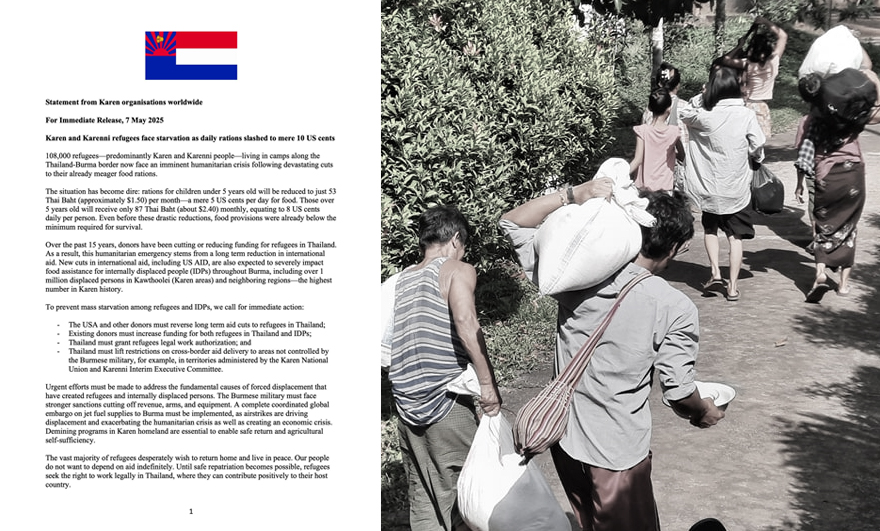20 Karen Organizations Warn of Humanitarian Collapse as Junta Attacks and Aid Cuts Leave Thousands at Risk
May 7, 2025
The humanitarian crisis facing communities on the ground along the Thailand-Burma border has reached a critical point. In an urgent joint appeal, 20 core Karen organizations—including civil society groups, ethnic health providers, and refugee service networks—are calling on the international community to respond immediately to life-threatening aid cuts that are affecting more than 108,000 people living in displacement resettlement sites and camps.
Refugees already facing insecurity and food shortages are now being told to survive on daily rations worth as little as 5 to 10 US cents. For children under five, monthly food allocations have dropped to just 53 Thai Baht (about $1.50). For adults, it’s just 87 Baht (around $2.40) per month—barely enough for survival. These cuts have been driven by long-term funding reductions from major donors, including the United States.

Meanwhile, in areas across Burma where many of these refugees originate, junta forces continue to escalate their military offensives. Communities in Kawkareik, Bilin, Kyaik Hto, and Dawei townships have come under near-daily assault through brutal airstrikes, indiscriminate artillery shelling, and other forms of aerial attacks. HURFOM field reports have confirmed widespread displacement, fear, and destruction in these areas. Thousands have been forced from their homes, and many have become voiceless IDPs with no access to food, shelter, or healthcare.
In Kawkareik Township, for example, junta battalions have repeatedly targeted civilian zones with no ongoing clashes. Entire towns have been emptied overnight due to fear of incoming shells. Meanwhile, humanitarian convoys are blocked from reaching those most in need, and security concerns continue to mount along key roads such as the Union Highway in southern Burma.
According to the 20 organizations, over 1 million people are now displaced across Burma, with the largest concentrations in Karen-administered areas. Refugee communities, already isolated and under-supported, now face the very real threat of starvation. The joint statement urges international donors, particularly the US and EU, to reverse their funding cuts and redirect aid to trusted local networks that are already providing services across the border.
Their recommendations include:
- Urgently reversing long-term funding cuts to refugees in Thailand
- Increasing support for displaced people inside Burma and in border areas
- Granting legal work authorization for refugees in Thailand
- Lifting Thai government restrictions on cross-border aid delivery to non-junta-controlled areas
“These aren’t just numbers—they are families, elderly people, children, and youth who’ve lost everything to war,” said a member of a Karen relief network working at the Thai-Burma border. “They have been displaced again and again. Now, they’re told there’s no food left.”
The statement also highlights the junta’s deliberate use of military attacks to destroy civilian infrastructure, livelihoods, and local governance. Airstrikes and artillery fire have disrupted planting seasons, destroyed schools and clinics, and worsened the overall humanitarian emergency.
As the war intensifies and humanitarian needs grow, the 20 Karen organizations reaffirm that refugees do not want to rely on aid forever. Most desperately wish to return home in peace. But until that is possible, they are asking for the right to work legally and live with dignity.
HURFOM stands in solidarity with these frontline groups and urges international donors to act swiftly. Withholding aid at this moment not only risks mass starvation, it undermines the resilience of communities who continue to resist the junta’s violence and build peace from the ground up.



















































